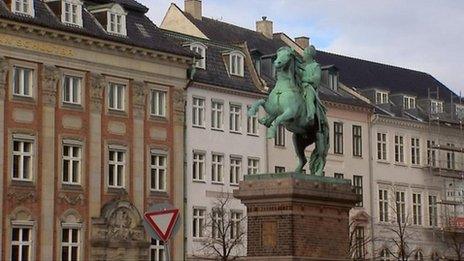Scottish independence: Why do Danes seem so delighted?
- Published
The first in a series of reports from Copenhagen looks at how the Danes pay for their generous welfare state
Last year Denmark was named the happiest country on the planet by Columbia University's Earth Institute, external. Little wonder this prosperous Scandinavian nation is often cited by supporters of Scottish independence as an example of how successful small states can be. So why do Danes seem so delighted?
It is early morning rush hour at the Konkylien child care centre.
Outside the building are a mix of parked buggies and bikes.
Very few children here are dropped off by car.
Inside, the children are settled in with a story.
Here 'all day' childcare costs parents about £200-£300 a month, a fraction of the actual cost.
Stein has just delivered her two children (on two wheels not four). A busy mother she says reduced price child care is vital.
"Without it we couldn't have this kind of society because both parents are working in most Danish households," she says.
The shortfall between what parents pay and what childcare actually costs is filled by some of the highest taxes in the world.
Peter is next through the nursery door.
A doctor who is married to a lawyer he believes Danish tax rates are "outrageous".
He says: "The level of taxes in Denmark is way too high. It is unreasonable to pay 65% tax."
But Stein takes a different view.
She says: "Danes don't mind paying taxes as long as we get good value for money."
But it is not just reduced childcare that those taxes pay for.
It is easy for a company to fire an employee in Denmark but when you lose your job the State steps in, offering unemployment benefit worth about £400 a week for up to two years.
Healthcare and elderly care are free.

Some parents think the taxes in Denmark are too high
Danes can go from school classroom to masters degree without being charged for their education and students still get paid grants.
Over at the Danish National Centre for Social Research Jørgen Søndergaard studies the society around him.
He says most Danes pay tax on their earnings with a total tax burden of between 50-60%, the highest of the Organisation for Economic Co-operation and Development (OECD) area.
But Mr Søndergaard says the system endures because of a broad political consensus which has lasted decades.
He says: "Of course there are differences. Some parties are more keen to have lower taxes and put ceilings on public budgets than others are.
"But you have a number of parties where there is more or less a consensus that we should try to keep the model with adjustments and reforms."

Denmark is reviewing its welfare system on a "continuous" basis
And those adjustments include raising the retirement age and looking at levels of student support.
John Dyrby Paulsen is finance spokesman for the ruling Social Democrat Party.
He told me they were now looking at some tough decisions including on early retirement benefits and payments to those who are off work sick.
But Mr Paulsen insists Denmark can still sustain its welfare system.
"We need to look at every aspect of our system. Yes, a population of five million people can sustain that kind of welfare system but again we need to look at it on a continuous basis."